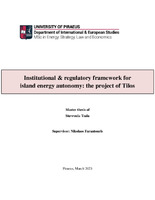Institutional & regulatory framework for island energy autonomy : the project of Tilos

Master Thesis
Συγγραφέας
Τσάλα, Σταυρούλα
Tsala, Stavroula
Ημερομηνία
2023-03Επιβλέπων
Φαραντούρης, ΝικόλαοςFarantouris, Nikolaos
Προβολή/
Λέξεις κλειδιά
Renewable energy sources ; Geopolitical framework ; Economic framework ; Institutional framework ; Regulatory framework ; Tilos project ; Hybrid power station ; Energy autonomy ; Non-interconnected islandsΠερίληψη
The coverage of daily energy needs comes almost exclusively from conventional energy sources, i.e. oil, gasoline and coal. Despite their great contribution, they irreparably pollute the environment while they are consumed quite fast, causing their supplies to run short. Conversely, Renewable Energy Sources (RES) are replenished through natural cycles and are considered practically inexhaustible. The sun, the wind, geothermal energy, organic materials such as wood and even household and agricultural waste are sources of energy, the supply of which is never exhausted. Moreover, their utilization for energy production does not burden the environment. But in addition, they mainly have low operating costs, which are not affected by the fluctuations of the international economy and in particular the prices of conventional fuels. Renewable energy sources are the modern answer to the earth's environmental problems and that is why their use is expanding more and more. Based on the above, both the European states and the entire global community are creating legislative frameworks in which the use of RES will be promoted and enforced. Looking at renewable energy initiatives that make the Greek islands energy autonomous, the Tilos project is an important innovative initiative aimed at both the island's energy upgrade using hybrid energy supply systems and the island's energy autonomy. In the light of this specific energy initiative, the present paper examines the European and domestic legal framework for the operation of renewable energy sources, the formation and organization of the Tilos program as well as its special characteristics, while proposing the possibility of future use of this hybrid method of energy production in the continental regions.


